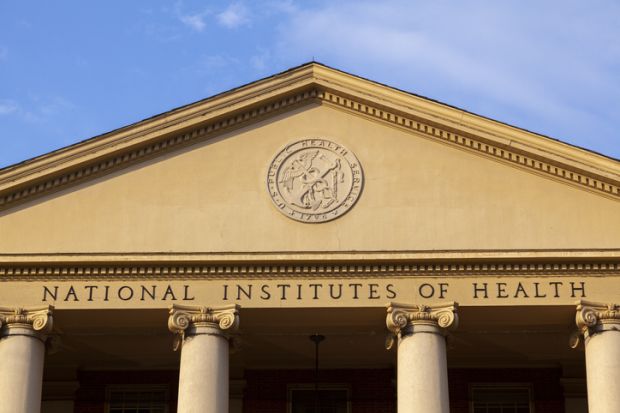US universities are trying to leave academics found guilty of sexual harassment in charge of major funding grants, a funder has warned.
The National Institutes of Health, the leading supplier of basic research money to universities, said it had seen repeated instances of institutions removing faculty from supervising staff but then trying to keep them in charge of grant management.
“We find that to be a disconnect,” said the NIH’s top official in charge of grant awards, Michael Lauer, the deputy director for extramural research. “It doesn’t make sense that someone can be trusted to oversee a federal award, but at the same time, they’re not trusted to oversee personnel.”
The NIH has an annual budget of about $48 billion (£37 billion), about $33 billion of which it awards for research beyond its own operations. It has been working for years to fight a widespread problem of researchers who sexually or otherwise abuse staff under their control, amid concern about its detrimental effect on efforts to increase gender and racial diversity in academic science. In recent years, the NIH has cut off grant support for dozens of scientists found to be involved in harassment.
Campus resource: Bullying by supervisors is alive and well – now is the time to tackle it
Yet the underlying problem appears to remain widespread in higher education. In one of the latest examples, researchers from Yale and Boston universities reported a project in which they studied years of postings on a popular jobs-related website for economists, and classified about 10 per cent of the entries as “toxic” because of racist or sexist content, with many of the instances traced to users at leading US universities.
High-profile individual cases include David Sabatini, the renowned biologist who was fired by the Howard Hughes Medical Institute and then resigned from a tenured faculty position at the Massachusetts Institute of Technology after he was found to have committed sexual harassment, and yet was considered for a job at New York University before getting more than $12 million from private investors to continue his research on cell signalling and cancer.
In a new analysis, Dr Lauer’s office said it received 206 allegations of sexual harassment between January 2018 and this April, found 38 per cent of the complaints to be substantiated, and removed the principal investigator in 74 per cent of those cases. “That’s a pretty high proportion,” Dr Lauer said.
But in perhaps “tens” of those cases, Dr Lauer said, the university at least tried to create a situation where the PI would be removed from direct supervision over staff while retaining authority over the administration of the grant award. Given the NIH’s ultimate ability to rescind grant awards, the universities almost always ended up respecting the NIH’s call for the person to be removed from grant jurisdiction, he said.
But that doesn’t mean the process is easy for the NIH, Dr Lauer said. “We’ve had difficult conversations with a number of institutions over the years in cases like this,” he said.
Even more complicated questions, Dr Lauer said, involve situations such as scientists moving to new universities after they face abuse allegations at their current institution. There, he said, the NIH typically won’t allow the grant to move with the scientist to the new location, though it can face obstacles to delivering that warning ahead of time to the new campus, partly because of privacy laws. “Those kinds of conversations can be tricky,” he said.
Register to continue
Why register?
- Registration is free and only takes a moment
- Once registered, you can read 3 articles a month
- Sign up for our newsletter
Subscribe
Or subscribe for unlimited access to:
- Unlimited access to news, views, insights & reviews
- Digital editions
- Digital access to THE’s university and college rankings analysis
Already registered or a current subscriber? Login








